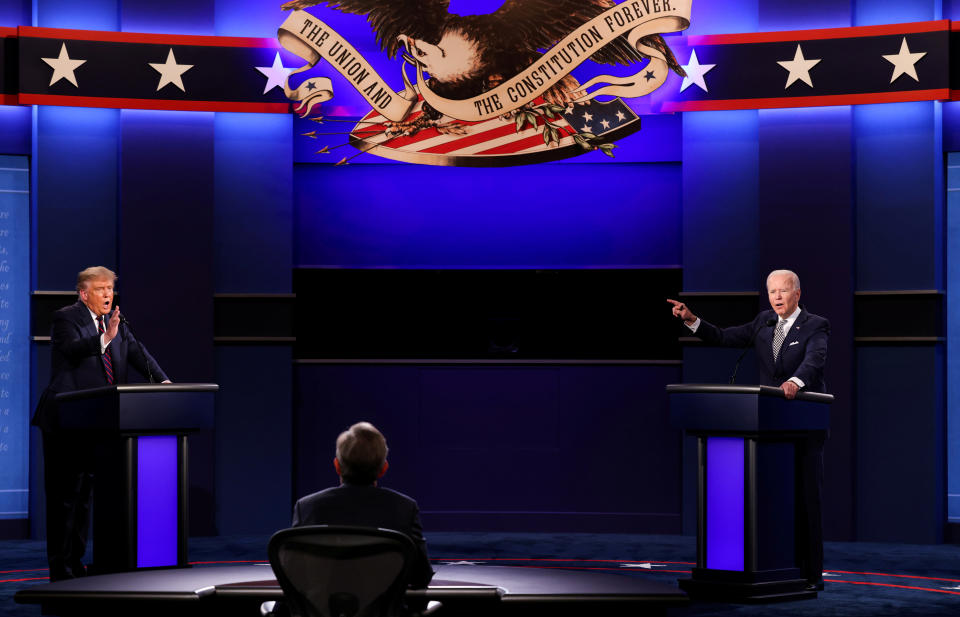Why markets hope Trump's deadlock with Congress may yield a bigger stimulus after Election Day
Patience, as the saying goes, may be bitter — but its fruit is sweet.
By severing negotiations with Congress over a new stimulus package, President Donald Trump may have committed a costly unforced error that could bolster Democrats heading into Election Day.
However, the delay may eventually lead to an even larger fiscal package next year — especially with investors increasingly warming to former Vice President Joe Biden.
On Wednesday, Trump dangled the possibility of piecemeal legislation that would address consumers and the stricken airline industry. Yet the ensuing rally suggests Wall Street is now pricing in a long game that involves a Democratic sweep of Washington, resulting in an even bigger stimulus — if Biden’s coattails are long enough to ensure his party’s majority in the Senate.
Even if the president and Congress can’t reach a deal, “Biden's widening lead in the election polls is making it likely that more substantial stimulus can eventually be agreed on,” Mark Haefele, chief investment officer at UBS Global Wealth Management, told clients in a research note this week.

To be certain, a Democratic sweep is still a big “if,” and the incumbent’s penchant for the unpredictable may yet allow him to pull off one last surprise. And few observers — including Smarkets — foresaw Trump’s stunning 2016 victory over Hillary Clinton.
Yet currently, all the stars seem to be aligning for Biden and his party. The hotly contested quest to flip the Senate is trending toward the Democrats, putting Republicans on the defensive as Trump’s polarizing response to the COVID-19 crisis — and his own infection — reshape the electoral terrain.
The latest data from Smarkets shows Biden’s odds rising to 67%, up from 63% in the week prior. Predictive market bets also see the former VP winning the Electoral College in blowout fashion: 323 to Trump’s 215.
With both opinion polls and predictive markets showing a Biden victory “is a more likely outcome now,” Haefele believes the prospect of a “blue wave” that gives Dems control of the White House and both chambers of Congress is also a growing possibility.
“We have always expected a blue wave to deliver more fiscal spending, as the Democrats are prioritizing economic recovery,” he added. “This would counterbalance proposals for increased taxation, and we anticipate a blue wave would be neutral for markets overall,” even if markets are volatile in the near term, Haefele said.
All else equal, such a blue wave would likely prompt us to upgrade our forecasts. Goldman Sachs
According to Olivier d'Assier at financial intelligence and risk firm Qontigo, a Biden presidency and a Republican Senate would be “the best case for markets” among a range of outcomes.
A Democratic White House with a divided Congress would feature “higher government spending, no new taxes, less social unrest, and a more diplomatic approach to foreign policy, and reflects the maxim that Americans prefer a divided government,” d’Assier noted.
However, with Biden’s polling numbers remaining stable despite widespread polarization, Wall Street watchers are starting to make a Democratic sweep their base case for the economy. Goldman Sachs, which had discounted a pre-election stimulus package weeks ago, said this week that one-party rule would be bullish for 2021 growth.
“All else equal, such a blue wave would likely prompt us to upgrade our forecasts,” the bank wrote in a research note.
“The reason is that it would sharply raise the probability of a fiscal stimulus package of at least $2 trillion shortly after the presidential inauguration on January 20, followed by longer-term spending increases on infrastructure, climate, health care and education that would at least match the likely longer-term tax increases on corporations and upper-income earners,” Goldman’s analysts said — estimating a boost of between 2-3 percentage points to growth.
There’s another outlier scenario that’s been increasingly discounted in recent weeks: A status quo election outcome that sees Trump keeping the White House and the GOP preserving the Senate. A “lame duck” session could still be positive for the economy, with Washington likely to pass more funds for small businesses, unemployment and schools.
Javier David is an editor for Yahoo Finance. Follow him on Twitter: @TeflonGeek
Follow Yahoo Finance on Twitter, Facebook, Instagram, Flipboard, LinkedIn, and reddit.
Find live stock market quotes and the latest business and finance news

